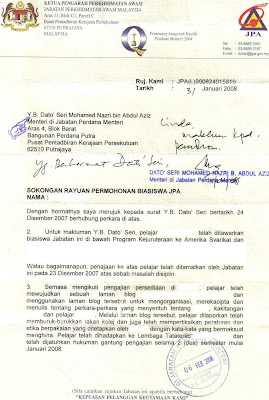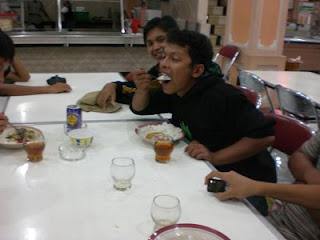The complainant, CK, was a JPA scholar studying at one of the pre-university centres in preparation for going overseas. In one of her blog post, CK criticised one of her college mates, YK that she had no fashion sense and that her dress made her look like a grandma. CK published YK's picture along with the post.
In addition, CK was critical of the college's rigid dress codes as well as the college's security personnel who acted like "guard dogs" for they would try very hard to find faults with the students.
YK's parents went beserk, approached their professor and threatened to bring CK to the police station.
Despite deleting the critical post(s), and sending in an apology letter as requested by the school (where her professor had promised CK that the case would subsequently be resolved), her scholarship was terminated a few months later.
Subsequently, she was suspended from the school late last year for 2 months and she has not been back to the pre-university centre for some 3 months to date. (There's the question of whether the termination of scholarship means she can't attend classes anymore.. as the centre's only meant for scholars).
The newly appointed deputy minister of education, Wee Ka Siong has been alerted a few months back. The minister in prime minister's department, Datuk Nazri Aziz has appealed on her behalf to JPA, but all to no avail.
Is this a case of JPA and the pre-university centre going to the extremes in punishing a student over a seemingly trivial matter (which should have ended with the letter of apology issued within days of receiving the complaint)? Or is there more than it meets the eye?
I've personally called upon the new Deputy Minister of Education to act in the interest of justice last week, and he has promised that he's still pursuing the matter with the prime minister's department (which is in-charge of JPA).
In the interest of the bright young student, her scholarship and place at the school should be immediately re-instated. CK may not have been an angel, but certainly in this case, the punishment meted out is clearly disproportionate to the crime, if ever there was one in this case.
If the case isn't resolved by the time Parliament starts at the end of April, I'll contemplate bringing the issue into Parliament as well.
For those interested, the sequence of events on the above case is as follows:
- --.07.07 - CK wrote articles with regards to dress code and security personnel on blog
- 10.08.07 - CK wrote post criticising college mate's dress sense
- 11.08.07 - CK wrote apology letter to college
- 12.08.07 - CK wrote apology letter to YK
- 23.08.07 - College warning letter to CK

- 27.11.07 - JPA scholarship termination letter to CK

- 30.11.07 - CK appeal against termination letter sent to YB Wee Ka Siong
- 19.12.07 - Disciplinary hearing by college against CK
- 03.01.08 - College letter of suspension to CK

- 15.01.08 - CK appeal against college suspension
- 15.01.08 - CK appeal against scholarship termination via college
- 31.01.08 - CK appeal against scholarship termination to YB Ong Ka Ting
- 04.02.08 - College rejected appeal against suspension
- 31.01.08 - Appeal by YB Datuk Nazri Aziz against scholarship termination rejected by JPA


- 13.02.08 - JPA rejected CK appeal against scholarship termination







